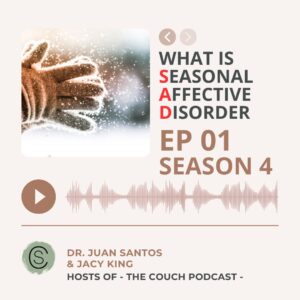Coping With The Winter Blues
From November to sometime in late February, some of us experience what is called the winter blues. Based on the name, you would think it’s a song found in a jazz album. Maybe it is. I’m not sure.
During the cooler months there is:
- Less sunlight.
- Shorter days.
- Colder weather.
- Cloudy days.
This means that during the winter months, we absorb less vitamin D. This is the key vitamin that helps to regulate mood and reduce depression. We also may spend less time outdoors, socializing with friends, and exercising.
It’s almost the perfect recipe for things to go in the wrong direction.
In the world of therapy and mental health, the winter blues is associated with Seasonal Affective Disorder (SAD). Season Affective Disorder is more severe than the common winter blues.
Common symptoms of the winter blues:
- Decrease in time spent with peers. Such as spending less time with friends or reducing typical social engagements.
- Lack of motivation.
- Decrease in energy.
- Changes in sleep. Such as sleeping too little or too much.
- Changes in appetite. Such as overeating.
If you are experiencing the winter blues, I want to share with you 4 coping skills that you can practice. Each gives you support in addressing the negative symptoms and challenges that come with the winter blues.
4 Ways To Beat The Winter Blues
1. Practicing gratitude daily.
This exercise promotes positive thoughts and feelings, reduces stress levels, and brings you calmness. With practice, you’ll notice a healthy shift in your wellness.
Use the journal prompts below as a guide:
- Who in my life am I grateful for and why?
- What part of my daily routine am I thankful for?
- Three-body parts that I am grateful for?
- Music that I am grateful for is?
- Write a letter to yourself expressing gratitude.
To get started with journal writing click here.
2. Actively engaging in exercise.
Exercising promotes an endless list of positive benefits. The winter blues often cause a person to experience low energy. If you can, try to spend more days than not engaging in movement.
You can go for a walk, practice yoga, or partake in a sport such as recreational basketball.
If you are experiencing the winter blues, try yoga.
Benefits of practicing yoga include:
- Reduction in stress.
- Improvement in pain, such as back or neck pain.
- Understanding and managing pain.
- Ability to connect to a community. Such as joining a yoga club in your area or online as a way to connect with a supportive community.
- Improvement in circulation.
- Reduction in risk to injury.
- Improvement in muscle tone, strength, and flexibility.
3. Level up your mental health.
The change in weather patterns during the winter months can lead a person to experience a lower mood, difficulty being around others, or a challenge to get out of bed. These symptoms directly mental health and can progress to more severe symptoms.
To level up your mental health, you can work with a counselor near you. The office of Santos Counseling PLLC provides therapy for those in Greensboro and can support anyone in North Carolina with online therapy.
Benefits to working with a counselor:
- Develop healthy coping skills.
- Understand triggers.
- Create healthy boundaries.
- Learn to accept feelings and process them constructively.
- Create healthy support systems.
- Retrain your brain.
- Develop healthy habits and behaviors.
4. Therapeutic breathing.
A simple strategy is to give yourself 5 to 10 minutes to be alone. During this time – allow yourself to take 4 to 6 deep breaths.
- Start by inhaling for 4 seconds.
- Next, exhale for 4 seconds.
- Repeat this 4 times.
Tip: When exhaling pretend that you have a straw in your mouth.
This strategy helps you:
- Simply reset the clock of stress.
- Catch a break.
- Regain your sanity.
- Regain control over the situation.
- Manage your stress and anxiety.
For more exercises to practice that address stress click here.
As you walk away from this reading, I want to first thank you for devoting time to your mental health and wellness. Keep an eye on the winter months and how you react to them. I hope that the coping skills shared support you in life.





